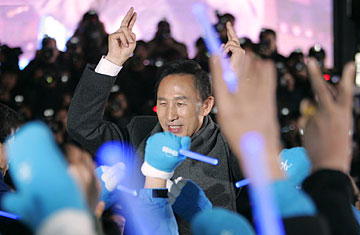
Lee Myung Bak celebrates his presidential win with supporters at his party's headquarters in Seoul, December 19, 2007
Lee Myung Bak is known as the "Bulldozer," and he earned his nickname in an era when South Korea made the extraordinary seem almost routine. Two decades ago, when Lee was running Hyundai Engineering and Construction Co., the country made a bloodless transition from an authoritarian dictatorship to democracy, hosted a successful Summer Olympics, and repeatedly racked up annual economic growth of eight percent or more, creating Korea's own economic miracle. On Wednesday, a nation pining for those days of hyperfast growth elected Lee President in a landslide, giving him about 48 per cent of the vote in a field of 10 candidates. Addressing his supporters at the Grand National Party's headquarters after his victory, the President-elect declared flatly, "I will revive the endangered national economy."
Lee, who was Mayor of Seoul from 2002 to 2006, focused his campaign relentlessly on reviving Korea's economic glory days — even though, statistically speaking, things are anything but dire. Growth this year will be around five percent, unemployment remains below four percent, South Korea's exports last quarter set an all-time record and the country's Internet infrastructure is among the most sophisticated in the world. But statistics, analysts here say, don't capture the economic angst many South Koreans feel. "It's become a time of reduced expectations, particularly for people in their 40s, who make up the single largest bloc of voters," says Whang Sang Min, a psychologist at Yonsei University, who conducts periodic surveys of voter attitudes in South Korea. "They don't view five percent growth as very good, and — rightly or not — they feel very insecure about their economic futures."
Enter the Bulldozer. His personal story, more than any policy proposals, seemed to capture the voters' imagination. He grew up in a one-room house in Seoul, and his parents worked as street vendors. Lee himself worked his way through college by peddling fruits and vegetables. He joined Hyundai in 1965, and by 1977, at the age of 35, was running one of the vast chaebol's subsidiaries. "He's a man of great drive," says 26-year-old Kim Hyo Jin, a cashier in a Seoul restaurant. "That's what we need now."
Lee, 66, tapped into the yearning for the good old days with simple — if maddeningly vague — proposals. He called his economic plan "Korea's 747 vision," promising seven percent economic growth, a doubling of per capita income to $40,000 per year, and a promise to make the country the world's seventh largest economy within five years (it's currently 13th.) How will he do this? Kim Yun Hwan, one of his economic advisers, says he'll slash corporate tax rates by a third, to 10 percent, which he believes will spur investment and job creation. After that, things get fuzzy. Lee has talked repeatedly of reducing the number of regulatory hoops Korean entrepreneurs need to jump through to start a business, something that could help reduce unemployment among the young, which is about twice the national rate. But he has never said which regulations, specifically, he would get rid of. He also says he wants to create jobs by building a massive, national canal which would connect the nation's rivers; advocates say this would make the country's transportation system more efficient and reduce truck traffic on clogged highways. How much the project would cost is anybody's guess.
Foreign policy, and the South's relations with North Korea specifically, barely factored in Lee's victory. That's due in part to the current momentum in defusing the North Korean nuclear crisis, as well as a successful summit meeting in October between current President Roh Moo Hyun and Kim Jong Il. Lee said during the campaign that as long as the North Korean leader lives up to his pledge to disable and then dismantle his nuclear weapons program, he will allow further economic aid and investment to go forward. That position is virtually indistinguishable from the so-called Sunshine Policy that's been in place for a decade now — a policy Lee's Grand National Party has traditionally been bitterly opposed to. Not this time. "For most voters, [North Korea] was an out of sight, out of mind issue in this election," says psychologist Whang. "It didn't register."
Neither did the allegations of corruption that dogged Lee right up until the end of the campaign. Many voters simply yawned. "When you get to [Lee's] level — a CEO, a presidential candidate — a little dust falls off everyone when you shake them," is the way cashier Kim put it. A tad cynical, perhaps. But exactly 20 years after the first free and fair election in the country's history, South Korea is now behaving like nothing if not a mature democracy. Turnout in this election was just over 62 percent of the eligible electorate — down sharply from the 71 percent that turned out to elect Roh Moo Hyun five years ago. For all their concern over the state of the country's economy, the more important message from South Korean voters in election 2007 may be this: South Korea has become so stable and so prosperous, that nearly 40 percent of the electorate is downright bored with politics.
